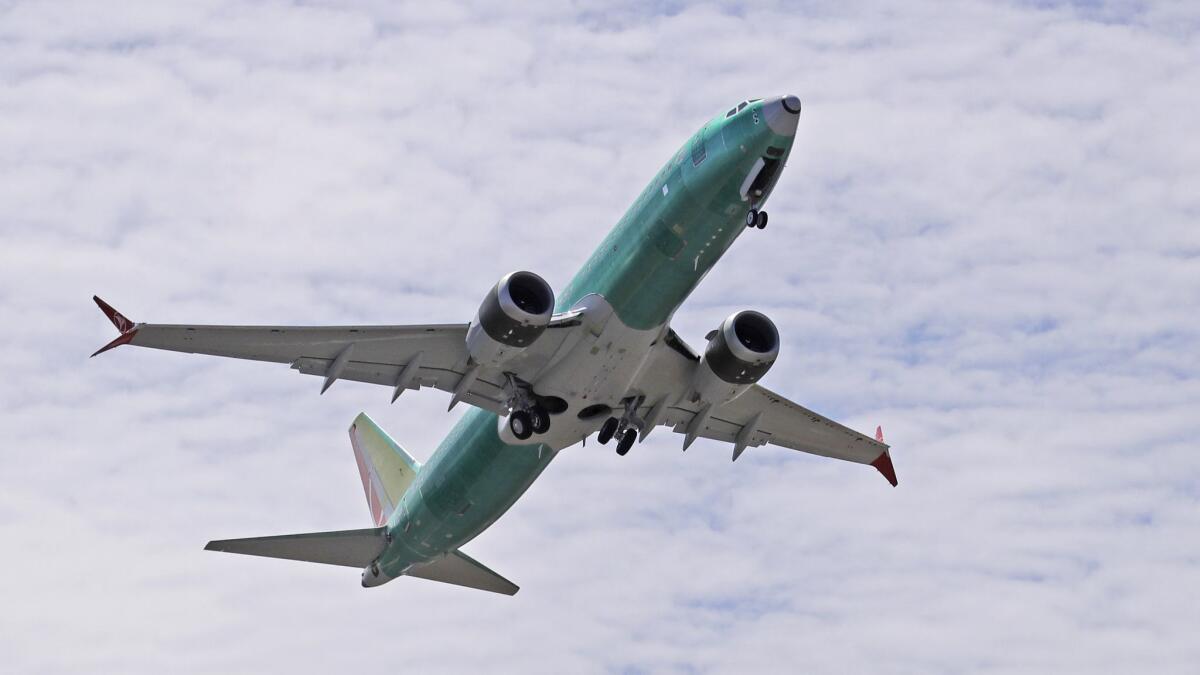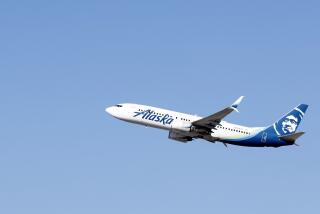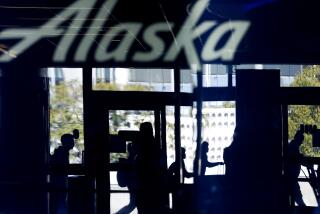Many fliers say they will avoid Boeing’s 737 Max even if it’s cleared to fly

- Share via
U.S. airlines have their work cut out for them in trying to coax frightened travelers back onto Boeing Co.’s 737 Max once a worldwide grounding ends.
At least 20% of U.S. travelers say they will definitely avoid the plane in the first six months after flights resume, according to a study led by consultant Henry Harteveldt. More than 40% said they’d be willing to take pricier or less convenient flights to stay off the Max. A separate UBS Group AG survey found that 70% would hesitate today to book a flight on Boeing’s bestselling jet.
The 737 Max is, for now, an ‘airplane non grata’ — a plane passengers do not want to fly.
— Henry Harteveldt, Atmosphere Research Group
“Travelers aren’t merely scared of the 737 Max, they’re terrified of it,” Harteveldt, president of Atmosphere Research Group, said in the report, which was released Tuesday. “The 737 Max is, for now, an ‘airplane non grata’ — a plane passengers do not want to fly.”
The surveys underscore the challenge looming for Boeing as it seeks to regain public trust after two deadly crashes and a global flying ban that’s nearing the three-month mark. Boeing is finalizing a software fix for a flight-control system malfunction linked to the accidents, as well as proposed new pilot training. Regulators in the U.S. and other countries say there’s no timeline for when the plane will resume flights.
Only 14% of U.S. passengers would definitely fly on a 737 Max within six months of its return, according to the online study for Atmosphere of 2,000 U.S. airline passengers from April 27 to May 1.
Participants in the 38-question survey had to have taken at least one round-trip flight for business or personal reasons during the previous 12 months. They were selected at random in the U.S. by a third-party market-research firm that operates a global consumer panel of more than 100 million people.
Boeing declined to comment on the Atmosphere and UBS reports, but pointed to recent remarks by Chief Executive Officer Dennis Muilenburg.
“We’ll do everything possible to earn and re-earn that trust and confidence from our airline customers and the flying public in the weeks and months ahead,” Muilenburg said. “We take the responsibility to build and deliver airplanes that are safe to fly and can be safely flown by every single one of the professional and dedicated pilots all around the world.”
Southwest Airlines Co., the largest operator of the Max, and United Continental Holdings Inc. have said they will let fearful passengers switch from the Max to flights on other aircraft with no fee. The CEOs of both carriers also have said they plan to be on initial Max flights once it returns to service. The companies, along with American Airlines Group Inc., haven’t commented further on how they will convince potential travelers that the Max is safe to fly.
Responses to the Atmosphere survey showed passengers have lost confidence in Boeing since the crashes, and were 10 times more likely after the grounding to describe the Chicago-based planemaker as irresponsible, arrogant and unsafe.
The survey showed 63% of business travelers and 65% of leisure passengers aren’t sure if they would want to fly the Max a year after its return to service. But in a positive sign for Boeing, that indicates most travelers will eventually consider boarding the plane if the manufacturer and the airlines succeed in restoring traveler confidence, Harteveldt said.
More to Read
Inside the business of entertainment
The Wide Shot brings you news, analysis and insights on everything from streaming wars to production — and what it all means for the future.
You may occasionally receive promotional content from the Los Angeles Times.










